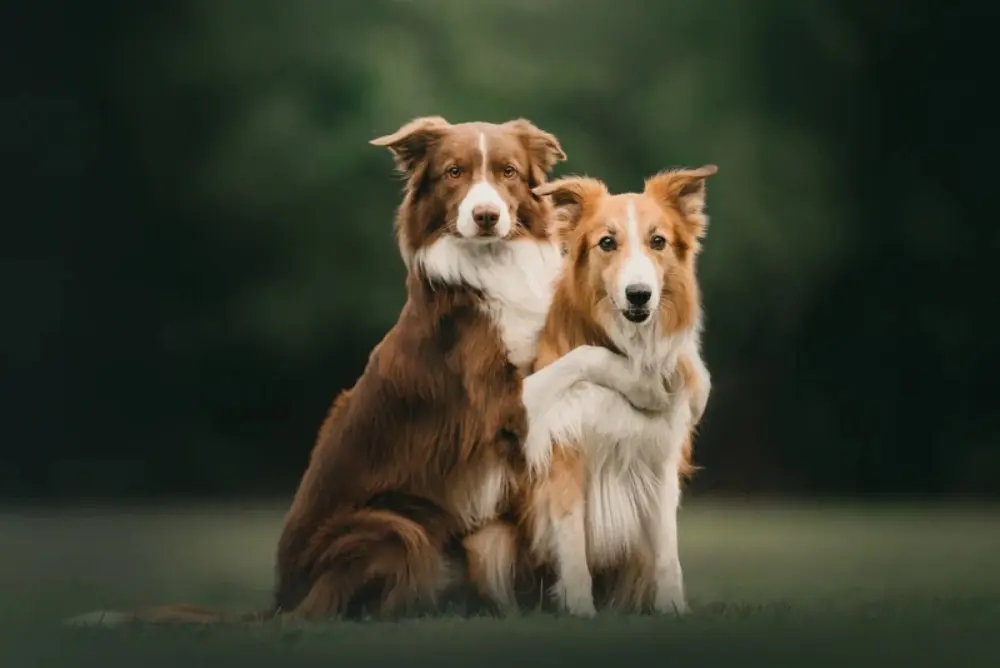What Happens to Bonded Dogs When One Dies?
- August 12, 2022
- Celebrations of Life

Many times, you will have bonded dogs, and they are inseparable. That’s amazing, and it adds a unique, exciting approach to life. But unfortunately, at some point, one of them will eventually die, either due to health issues or old age. It’s a clever idea to create an obituary for your lost dog when something like that happens. Yet the question is, what can you do for the remaining dog when one of the bonded dogs passes away? Let’s discover!
Dogs act differently while grieving
Just like humans, dogs are grieving too. They have their own way of grieving, but they grieve, which you need to consider here. While we can assume how dogs grieve, there’s no real way to know how they feel. What we can do is evaluate the things we see. And yes, for the most part, a dog will have behavioral changes. Those appear due to the dog not feeling the company of the other dog.
That leads to social withdrawal most of the time, which is what humans do in a situation like that. It’s imperative to address the situation the best way we can, and in doing so, we will be happy with the outcome. If not, the dog will be there sad, affecting their diet, health, and a variety of other things. That’s why you want to tackle all this stuff because it will help immensely in the long run.
What are the signs of grief in dogs?
Yes, there are signs of grief, and you must check for them to see how your dog is doing and what is happening. Generally, a lack of appetite is one of the primary things to handle here, and that’s a thing to deal with. They will continue to stay away and withdraw from other people or dogs too. They are feeling emotional pain, and they want to deal with it in their own way. Obviously, this is something we understand as humans, since we face things similarly.
A grieving dog will also sleep more than usual and even have lethargic behavior. Not only that, but there will be an inappropriate elimination from the home and the dog will vocalize or call out for the dog as much as possible. That might actually become more common than you realize since the dog is clearly dealing with an issue, and you want to solve that as much as possible.
Sometimes, the grieving dog will also cling to the owner. They don’t have the other dog to keep them company. So, what a grieving dog will do is he will try to stay with the owner a lot to solve this issue. It will be well worth it, and that alone will make the process better for him as he focuses on getting past this. It can be possible that the dog might even try to find the other dog within the home. That can be a sad thing to see, but it is a part of the healing process, and there’s not a lot you can do.
How much will a dog grieve?
A grieving dog might maintain this behavior for a random amount of time. Like humans, it can take a different amount of time to heal. Some dogs will heal right away. Others can take weeks or months until they get back to their regular behavior. And that’s because grief is hard to measure, and you never know how much grief a dog must deal with.
Some dog behavior analysts suggest that puppies can deal with a lot of grief, which can be problematic for their development. That’s why socialization is key in a situation like that. Every dog will face grief differently, so the best thing we can do is to offer our dog the support we can. Once we do that, things become easier to tackle once we do that, and the results might get even better. These are the approaches we must take, and in the end, the results can be good.
How can you help a grieving dog?
The best thing you can do is to be there for him. Even if the dog is lethargic and sleepy most of the time due to grief, you still need to ensure that he eats properly, gets the right exercise, and so on. Addressing these simple but important aspects are the right things to consider as that’s what will make the rightful difference. Will it be hard to do that? Yes, because the dog will continue to grieve in his own way.
Getting a new dog can help the grieving dog since he can offer the socialization that your grieving dog needs at this time. If you’re not ready for something like that, other things like finding play dates with other dogs can come in handy. You can also find new activities to try out with your dog if you can. The idea is to not just let the dog sit and grieve. Try to help as much as you can.
It might also be a great idea to take your pet to the vet if you can. The vet can let you know how to solve the current issues that your dog is dealing with. Some grieving dogs might have underlying health issues too, so handling and addressing those properly can be a great option. You have to consider that for the best results. Every simple action you take to protect your dog and ensure that he goes through the grieving process quickly is important.
Related Articles

How to Honor Your Pet Companion’s Memory
- July 18, 2024
- Celebrations of Life

What Happens to Bonded Cats When One Dies?
- August 30, 2021
- Celebrations of Life

What Kind of Behavior Does a Dog Exhibit Before Death?
- August 8, 2021
- Planning

What to Do When Your Pet Passes Away at Home
- July 24, 2021
- Planning
Search Articles
Sign Up For Our
Newsletter
Stay up to date on resources to help you prepare.
